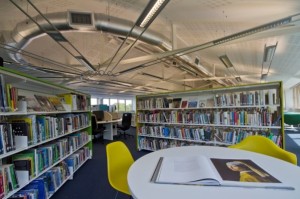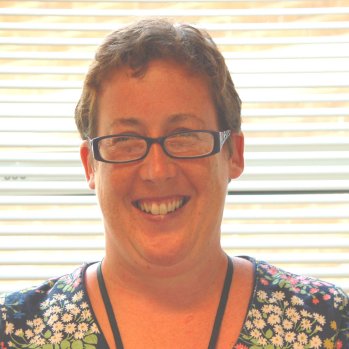On a lovely spring day in mid-March, we climbed aboard the Dorset Safari to visit a selection of libraries along the south-west coast. First stop was the Wey Valley School Library, where we learned how Eileen Harding, the Learning Resources Manager, had transformed the reading habits of pupils using the Accelerated Reader Programme (introduced in September 2014). From a standing start, when few pupils picked up a reading book, the most recent academic year saw pupils read over 1,700 books – that’s over 54 million words. How did she do it? Well, Eileen enlisted the help of Renaissance Learning software which matches children’s fiction books to pupils’ reading level and interests. The software then tracks their understanding via an online 34-question quiz after each book they read.
 The questions are carefully phrased to check each pupil’s knowledge of the storyline as well as their understanding, and each book is selected to expand the pupil’s vocabulary. Eileen also uses the information to identify pupils with special needs, so that they can be given any extra help they require.
The questions are carefully phrased to check each pupil’s knowledge of the storyline as well as their understanding, and each book is selected to expand the pupil’s vocabulary. Eileen also uses the information to identify pupils with special needs, so that they can be given any extra help they require.
The software tracks the progress of individual pupils’. It has been noticed that boys, in particular, love to know how many words they have read over the term. The school now has dozens of word millionaires! The pupils are encouraged to set themselves targets and like the immediate feedback provided by the quiz, which motivates them to read even more. As a result, 89% of students have seen an improvement in their reading age during the course of the first year.
The Wey Valley School Library uses the Micro Librarian System to manage their stock, which includes the Reading Cloud, accessible via the Internet. It can be used as a social media platform, allowing pupils to chat to one another about books they have read. If they want, they can blog about books they’ve liked and make recommendations. It even allows pupils to add their own home reading books, so they can share them with friends.
Our second stop was The Verne Immigration Removal Centre in Portland, which houses up to 580 immigrant detainees while their cases are being assessed.
Originally, The Verne was designed as an impregnable fortress, built by convicts from Portland Prison between 1860 and 1872, to protect the harbour and nearby coastline from invasion. In 1937, it was being used as an infantry training centre, then converted to a prison after the Second World War. It eventually become a medium-security prison for over 600 long-term ‘Category C’ prisoners. Finally, in 2013, its function changed again when it was designated as one of the country’s immigration removal centres.
Even though most detainees are there just a short while (sometimes as little as a day), it is a requirement for all detention centres to have a library. Dorset County Council administer the one at The Verne, which stocks books, newspapers and magazines in a variety of languages. Elizabeth Bean, the Librarian, says there are currently 53 different languages spoken by detainees at The Verne, with the most common being Bengali and Chinese.
The detainees have free access to the Library every weekday, two evenings per week and at weekends. Elizabeth hinted that providing a library service for detainees can be emotionally challenging because they are often distressed. Given the predicament of the detainees, it is not surprising that the most sought-after books are on immigration law. The Library also offers a legal-aid booking facility and information about charities and immigrant support groups.
After a splendid lunch at the Jailhouse Café, we were driven inland to Dorchester Public Library, which opened in 2013. Apart from the normal library fare, it offers community spaces where locals of all ages can meet and learn. Spread out over three floors, the ground floor also plays host to various partners, such as tourist information, adult education (skills and learning) and the Dorset police contact unit. Within the complex, there are six classrooms that are used for various activities – many of which are oversubscribed. One new feature is the Changing Places accessible washing facility, that is available to members of the scheme even when the Library is closed. I imagine this will be a huge help to those with restricted mobility that cannot access facilities elsewhere.
The Library sees an average of about 1800 customers per week and also offers a Housebound Service to 71 residential homes in the region that get free delivery of books. This service replaced the mobile libraries that were abolished by the local authority during December 2016. Dorchester Public Library also acts as a hub for inter-library loans, which are handled in a busy back office. In total, there at least 10 staff are on duty each day in the Library, with over 20 in the team altogether.
 Francesca Roper explained that space on the upper ground floor is divided into themed zones including Teenage Headspace with shelves of teenage literature and an easy access Children’s Library, where popular rhyme-time sessions are held twice a week. Another innovation, are the Library Gets Lively sessions for under 5’s and a Chatterbox reading group for slightly older ones, as well as a Youth Group for the 11+ children. In fact, since other youth activity providers have lost funding, this is now the only youth group in Dorchester. Classrooms are also used for adult skills and education, including the Reminiscence Sessions, where older members of the community can come in and share their memories and experiences. Digital Sessions are also popular, where members of the public can bring in their own equipment and get advice and guidance. Throughout the Library, the glass walls and pastel carpets and furnishing create a welcoming, airy, open atmosphere. The bookcases are also deliberately spread out, so that no space feels claustrophobic. At the back, an innovative Autism Room (designed in conjunction with the charity Autism Wessex), features dimmer lights, bean-bags and soundproofing to create a safe, soothing environment.
Francesca Roper explained that space on the upper ground floor is divided into themed zones including Teenage Headspace with shelves of teenage literature and an easy access Children’s Library, where popular rhyme-time sessions are held twice a week. Another innovation, are the Library Gets Lively sessions for under 5’s and a Chatterbox reading group for slightly older ones, as well as a Youth Group for the 11+ children. In fact, since other youth activity providers have lost funding, this is now the only youth group in Dorchester. Classrooms are also used for adult skills and education, including the Reminiscence Sessions, where older members of the community can come in and share their memories and experiences. Digital Sessions are also popular, where members of the public can bring in their own equipment and get advice and guidance. Throughout the Library, the glass walls and pastel carpets and furnishing create a welcoming, airy, open atmosphere. The bookcases are also deliberately spread out, so that no space feels claustrophobic. At the back, an innovative Autism Room (designed in conjunction with the charity Autism Wessex), features dimmer lights, bean-bags and soundproofing to create a safe, soothing environment.
Just across town, the Dorset County Hospital Education Centre was our final stop on the Dorset Safari. Morag Evans, the Trainee Librarian, told us that they provide information and research facilities to almost 1000 registered members, in a variety of NHS posts. Within the Library a new digitalisation project was underway, archiving patient records. The staff organise educational events for doctors, including lectures and workshops. The library staff also conduct literature research and provide research training for doctors and other staff. In addition, they offer referencing and reflective-writing workshops. They also carry out Ward Rounds and make book deliveries to the workplace. Although most of the research is available online, they have found that some NHS staff insist on a printed version. It seems that nurses, in particular, prefer to look at something on paper rather than on screen.
Jonathan Edwards
Senior Library Assistant (Bournemouth and Poole College)









